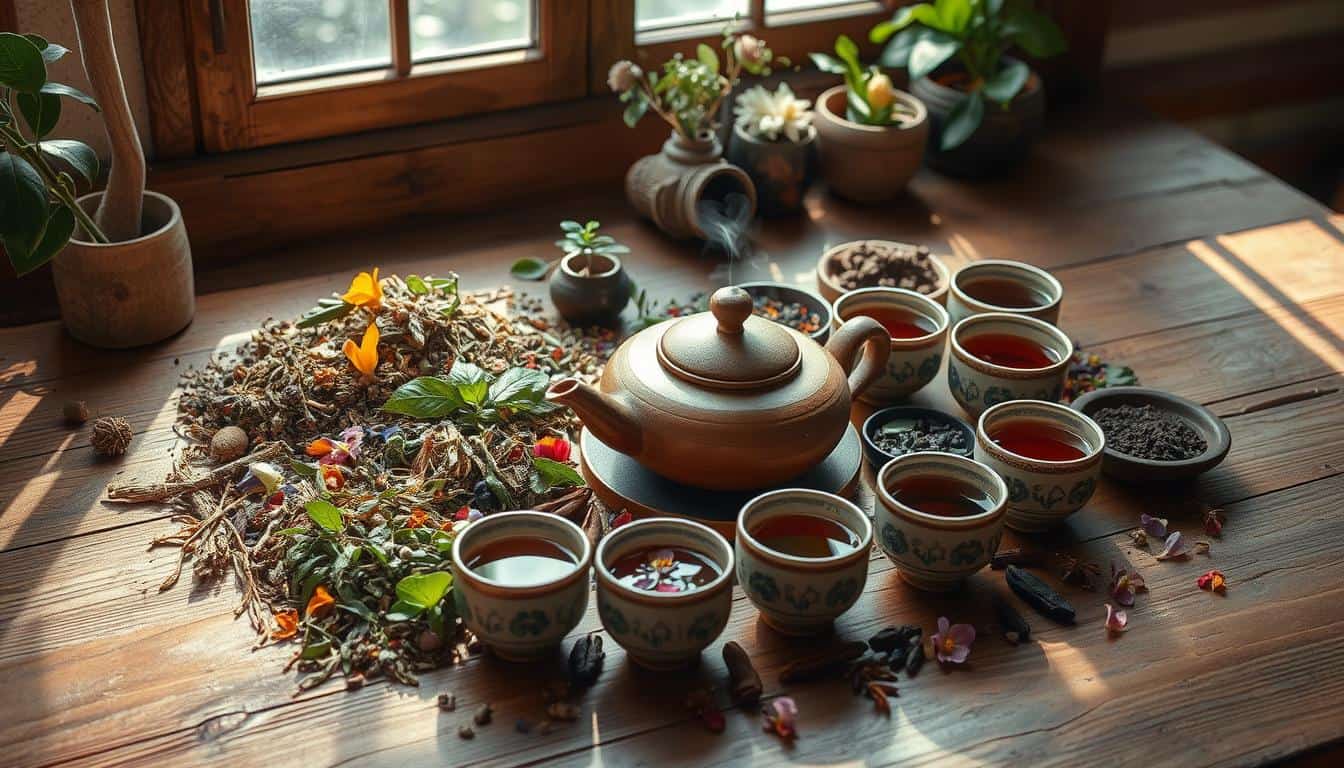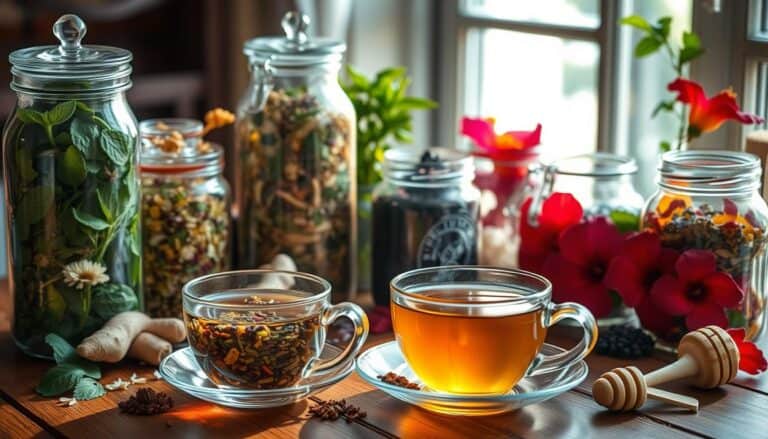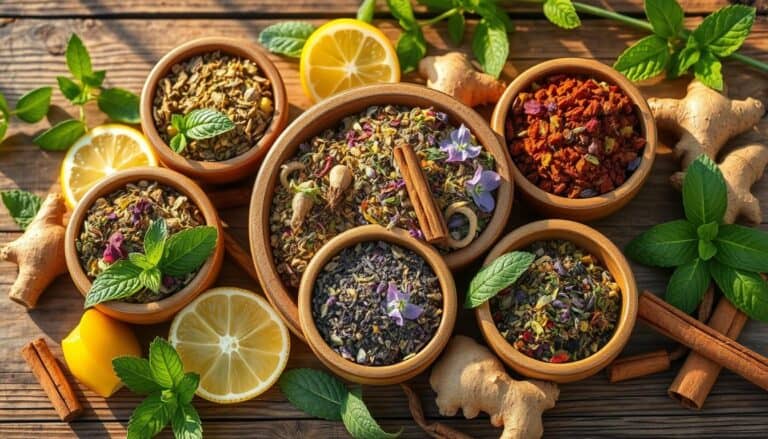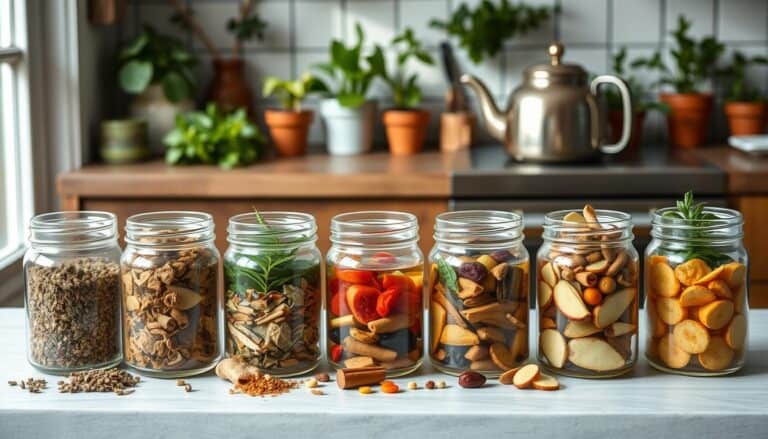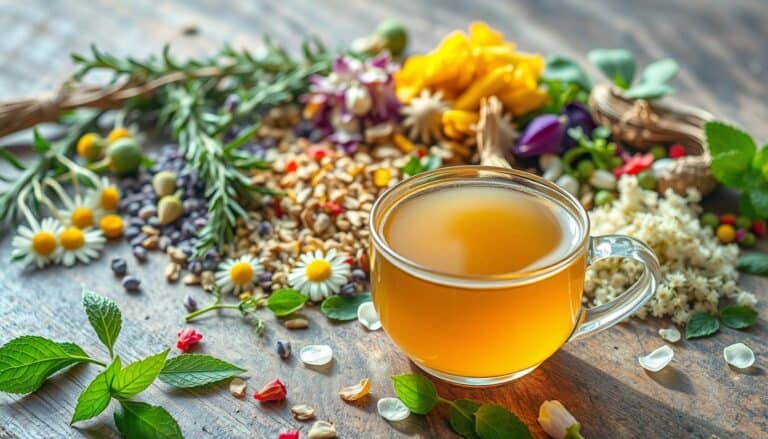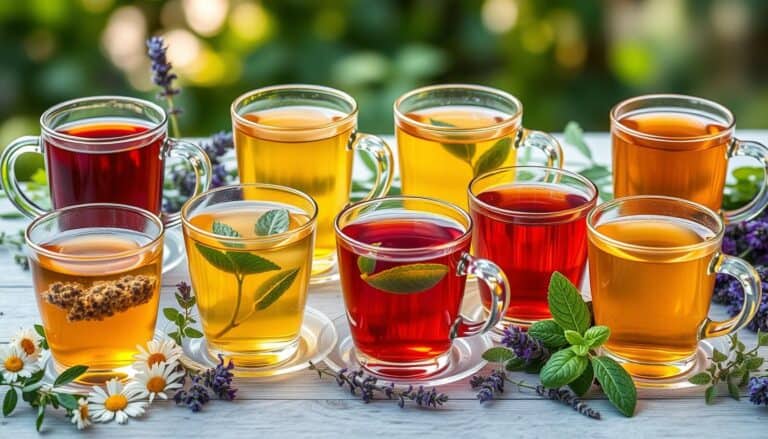Secret Ancient Herbal Tea Recipes Revealed
This post may contain affiliate links which means I may receive a commission for purchases made through links at no extra cost to you. I only recommend products I truly believe in. Thank you for your support!
Explore the world of herbal tea remedies cherished by ancient civilizations. These teas have been loved for thousands of years. They come from places like the Blue Zone of Ikaria and remote mountain villages.
Ancient medicinal plants are more than just a tasty drink. In Ikaria, Greece, people know how herbal teas can improve health. Studies show that drinking these teas can help people live longer and avoid chronic diseases.
The secret to these ancient herbal teas is in their ingredients. Rosemary, sage, and dandelion mix to make powerful drinks. These drinks help the brain, improve thinking, and protect against health problems.
Science now backs what ancient healers knew: herbal teas are strong natural remedies. Research in Greece shows that drinking herbal tea can boost thinking skills, even in the elderly. This makes these old recipes very important today.
These herbal blends are used in Greece and in tea ceremonies in Asia. They show a timeless way to stay healthy. They remind us that nature has the best medicines, hidden in every cup of tea.
The Historical Significance of Herbal Teas
Herbal teas have a long history, connecting cultures worldwide. They are more than drinks; they tell stories of health and cultural exchange. These teas are a bridge between ancient traditions and today.
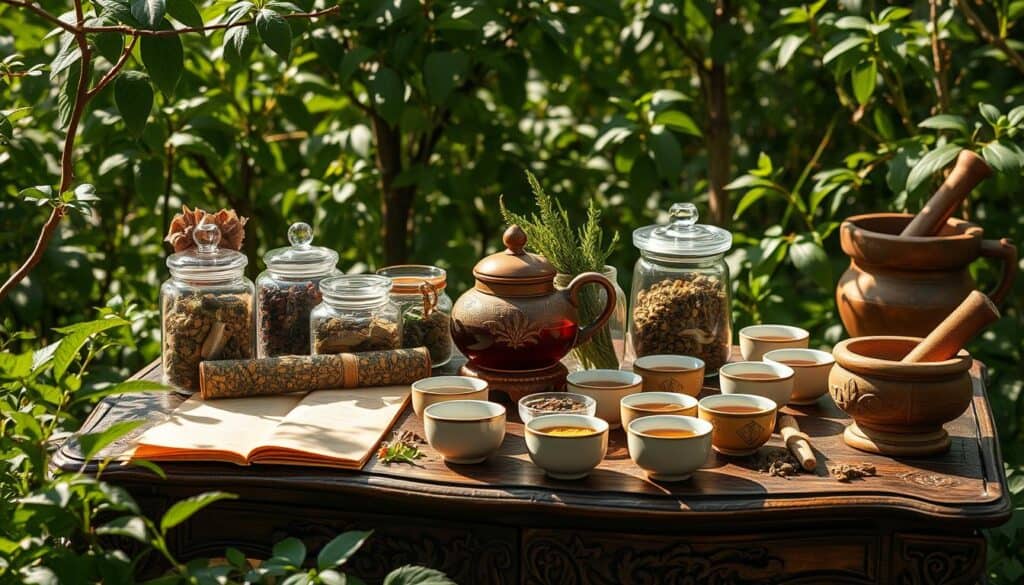
Ancient Cultures and Their Herbal Practices
Herbal teas have been around for thousands of years. In ancient China, tea was first discovered in 2737 B.C.E. by Emperor Shen Nong. He accidentally found it when a wild tea leaf fell into his pot.
During the Tang dynasty (618-907), tea became a national drink. Buddhist monk Lu Yu wrote about tea in his Classic of Tea. He detailed how to make tea, making it a special art.
- Chinese cultures developed sophisticated herbal medicine systems
- Tea preparation became a refined art form
- Herbal drinks were viewed as preventative health solutions
The Role of Herbal Teas in Traditional Medicine
Herbal teas were key in traditional medicine. In Traditional Chinese Medicine, they helped balance body energy. They were also used to reduce internal heat.
These teas helped with many health issues. They improved digestion and mental focus.
| Culture | Herbal Tea Purpose | Key Ingredients |
|---|---|---|
| Chinese | Energy Balance | Ginseng, Chrysanthemum |
| Egyptian | Medicinal Treatment | Lotus, Chamomile |
| Greek | Spiritual Healing | Sage, Mint |
Cultural Rituals Surrounding Tea Consumption
Tea was more than just a drink; it was a spiritual and social ritual. From Japan’s tea ceremonies to Native American sacred herb preparations, these traditions showed great respect for tea. They saw tea as a way to connect with nature and each other.
Popular Ancient Herbal Ingredients and Their Benefits
Ethnobotanical cures have been valued for ages. Forgotten herbal brews were key in ancient wellness. These brews showed the healing power of nature, leading to cherished tea rituals today.
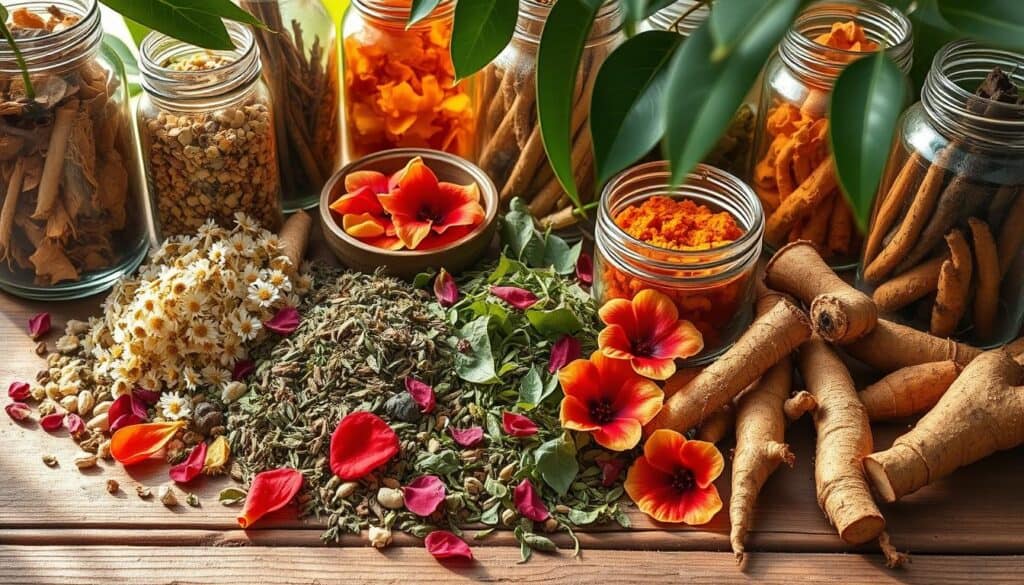
Herbal teas are filled with amazing ingredients. Each herb has its own healing powers. This turns simple drinks into powerful wellness tools.
Chamomile: A Soothing Experience
Chamomile is a gentle yet strong herbal remedy. This flower has been used for ages to:
- Promote relaxation and reduce anxiety
- Support better sleep quality
- Calm digestive discomfort
- Reduce inflammation
Ginger: A Powerful Digestive Aid
Ginger root is a healing powerhouse. Its amazing properties include:
- Alleviating digestive issues
- Reducing muscle pain and soreness
- Fighting respiratory infections
- Supporting circulation
Turmeric: The Golden Spice for Health
Known as the golden spice, turmeric has incredible health benefits:
- Powerful anti-inflammatory properties
- Rich in antioxidants
- Supports brain function
- Potentially reduces risk of chronic diseases
| Herb | Primary Benefits | Traditional Use |
|---|---|---|
| Chamomile | Relaxation, Sleep Support | Nighttime Calming Brew |
| Ginger | Digestive Health, Anti-Inflammatory | Warming Medicinal Drink |
| Turmeric | Antioxidant, Immune Support | Healing Tonic |
These ancient herbs are just a small part of natural healing. Their lasting popularity shows the wisdom of traditional herbal practices.
How to Brew the Perfect Ancient Herbal Tea
Learning to brew natural healing teas is a mix of science and art. It needs precision and respect for old ways. The process of making botanical infusions is special.
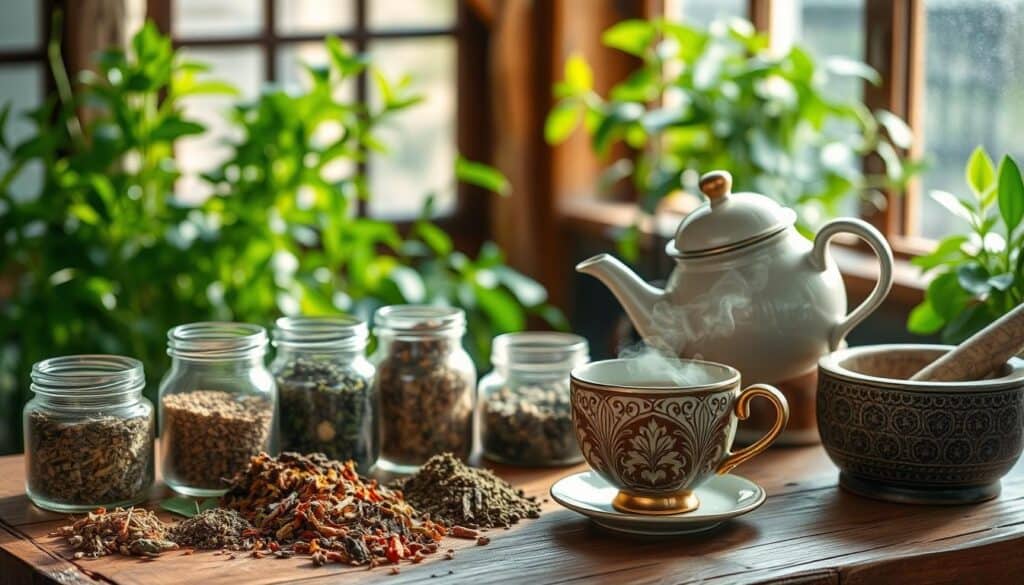
To make the perfect herbal tea, you need to pay attention to a few things. These steps can turn a simple drink into a memorable experience. From picking the right ingredients to knowing how to brew them, every detail counts.
Essential Tools for Herbal Tea Preparation
- Non-reactive ceramic or glass teapot
- Fine mesh strainer
- Measuring spoons
- Fresh, filtered water
- High-quality dried or fresh herbs
Ideal Brewing Temperature and Time
| Herb Type | Water Temperature | Steeping Time |
|---|---|---|
| Delicate Flowers | 180-190°F | 5-7 minutes |
| Roots and Bark | 200-212°F | 10-15 minutes |
| Leaves | 190-200°F | 7-10 minutes |
Flavor Enhancement Tips
- Use fresh herbs whenever possible
- Experiment with herb combinations
- Avoid over-steeping
- Use 2-4 teaspoons of herbs per cup
- Allow herbs room to expand during brewing
Understanding each herb’s unique traits is key to traditional herbal lore. Brewing times can change, so listen to your senses. The aim is to blend flavors and health benefits together.
In Ikaria, an island famous for long life, locals make special herbal teas. They mix rosemary, sage, and dandelion. These teas are more than drinks; they’re a way to celebrate health and culture.
Secret Recipes from Ancient Civilizations
Ancestral tea wisdom opens a world of ancient healing secrets. Forgotten herbal brews connect us to the past. They show us the power of natural medicine.
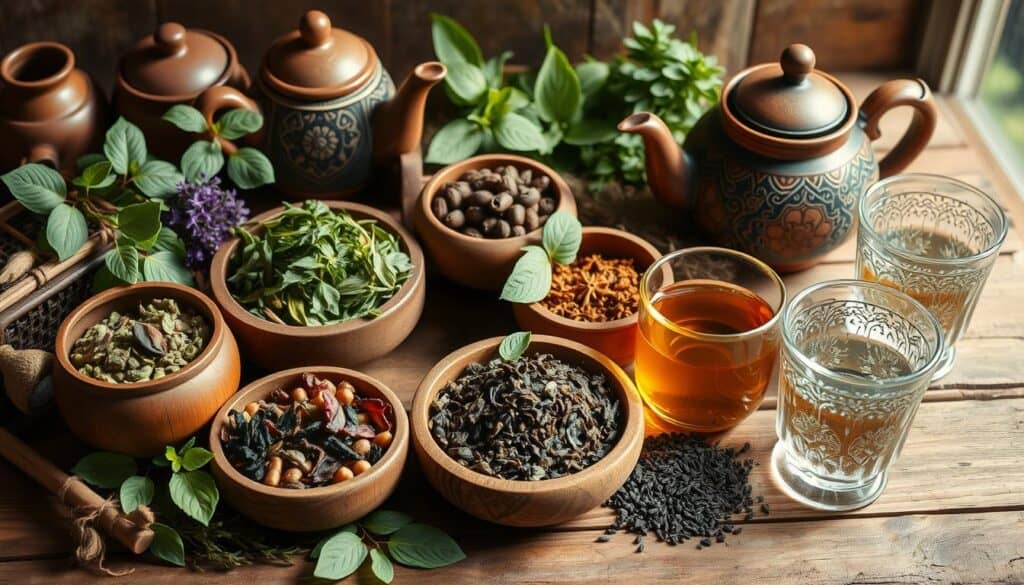
Herbal teas were more than drinks; they were healing tools. Each culture made its own special teas using local plants and old knowledge.
Ancient Egyptian Herbal Tea Delights
Egyptian healers made complex tea recipes. They used plants to heal and showed great knowledge. Their favorite ingredients were:
- Chamomile for relaxation
- Mint for digestive support
- Fennel for overall wellness
Traditional Chinese Herbal Tea Variations
Chinese herbalists blended teas for body and spirit balance. Their top blends included:
| Ingredient | Health Benefit |
|---|---|
| Ginseng | Energy and vitality |
| Goji Berries | Immune system support |
| Chrysanthemum | Stress reduction |
Indigenous American Herbal Infusions
Native American tribes had remarkable herbal brew traditions. They used local plants for healing:
- Sage for spiritual cleansing
- Elderberry for winter wellness
- Yerba Mate for mental clarity
These ancient recipes are more than drinks. They show us the deep wisdom of our ancestors. They teach us about holistic health that’s still important today.
Modern Adaptations of Ancient Tea Recipes
Tea lovers are giving old tea rituals a fresh spin. They’re mixing ancient herbal tea remedies with today’s wellness needs. This blend of old and new is changing how we see these ancient plants.
Fusion Flavors: Blending Tradition and Innovation
Tea makers today are mixing classic herbs with new flavors. They keep traditional ways but add a global twist. This creates exciting tastes that surprise and delight.
- Turmeric and lavender fusion
- Ginger and matcha combinations
- Chai-inspired adaptogenic blends
Health-Conscious Twists on Classic Recipes
Now, herbal teas aim at specific health goals. Precision brewing and special ingredients make these teas powerful. They use ancient plants in new ways.
| Traditional Herb | Modern Wellness Goal | Innovative Ingredient Addition |
|---|---|---|
| Chamomile | Stress Reduction | Ashwagandha |
| Ginger | Digestive Support | Probiotics |
| Echinacea | Immune Boost | Vitamin C |
Using Organic Ingredients for Purity
Tea fans want real, pure ingredients. They choose organic, sustainable herbs. This keeps the healing power of old tea rituals alive.
- Single-origin organic herbs
- Small-batch production
- Direct trade relationships with farmers
Exploring the Benefits of Ancient Herbal Teas Today
Natural healing teas are now key in modern health. They offer benefits beyond just drinking them. Almost 40% of people drink herbal tea to help them sleep better, showing a rise in holistic wellness.
The World Health Organization says 80% of people use plants for health. This shows herbal teas’ deep medicinal value. Today’s science backs up ancient tea wisdom. Herbal teas are full of polyphenols, which help fix cells, improve skin, and detox naturally.
Stress Reduction and Mental Clarity
Today’s fast pace needs good stress management. Herbal teas offer a soft yet strong way to improve mental health. Certain teas can lower anxiety, boost brain function, and clear the mind, all without harsh drugs.
Immune Support and Overall Wellness
Research shows herbal teas boost the immune system, reduce inflammation, and help the heart. Adding these teas to your day can help your body fight off sickness and stay healthy. This follows ancient plant-based health traditions.
Enjoying Herbal Teas as a Daily Ritual
Turning tea into a mindful moment brings more than health benefits. It connects us to ancient wellness practices. Whether for calm, immune support, or just a quiet moment, herbal teas offer a complete care approach.
